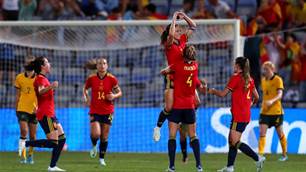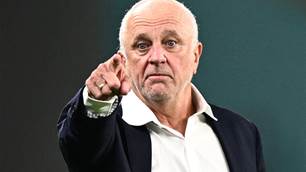QATAR want the World Cup and in a land where status is achieved through oil and gas, their wealth represents bad news for Australia.
When the Gulf state declared their intention to run for the 2022 tournament, the announcement attracted little more than a dismissive glance. After all, there is no football tradition in the area to speak of.
Then there is the date. The World Cup locations may change but the timings are always the same. June and July, when the mercury in downtown Doha is hitting 40 degrees and rising.
It is impossible to play any meaningful football in that heat, even if matches were scheduled for the middle of the night.
Throw in the fact Qatar is a four-hour drive from side to side - if you go north you drop into the Persian Gulf - and the obvious conclusion is that the entire geography is wrong.
But the Qataris are keen to overcome such obstacles.
While they felt the vast swathes of land which resemble building sites could be completed and left shiny and new for the 2018 tournament, 2022 is a better option because it fits in nicely with the 2030 masterplan - already under way - which includes a rail and metro system, a new airport and a bridge which spans the 32 miles to Bahrain.
So 2022 it is, the tournament Australia are favourites to host on the basis that 2018 will end up in Europe.
It provides plenty of time to further develop and refine the masterpiece of their bid, which makes the impossible reality.
There is nothing new about air conditioning. It is a feature across the globe. But air conditioning outside?
In fact, it is a water-based cooling system which can be switched on two hours before an event to reduce temperatures to 21 degrees on the pitch, slightly more in the stands.
Inside the Al Sadd Stadium if you look into the sky you can see the sun beating down. You know it is very hot. But you are quite cool. It works.
The critics raise concerns about the carbon footprint. Surely FIFA would never agree to that?
"Carbon neutral," say the bid chiefs with a straight face, outlining the use of wind and solar power and a promise that by 2022 Qatar will be developing second or third generation schemes which work even more effectively.
After tournaments have taken place in South Africa, Brazil and maybe even Russia, by 2022, they feel FIFA will be more accommodating to a bid where every venue is within two hours, with a promise that some will be relocated to more deserving cases in the Middle East once their primary function is over.
Uncomfortable issues remain. Alcohol and Israel for a start, both subjects that, in their different ways, Qatar does not recognise.
The bid team have answered both. Fan parks will serve alcohol, as well as hotels. Israel, as a competing nation, would be welcomed if they qualify. They never have before, so the chances are that issue will not need to be addressed. It does leave a sour taste though.
That could be one of the biggest problems for Qatar to overcome if they are to beat Australia, the United States, Japan, South Korea and no-hopers Indonesia as non-European candidates for 2022.
Failure in any other respect will not be arrived at for the want of a vision.
"It is time for the Middle East to host a major event such as the World Cup," said Hassan Al-Thawadi, chief executive of the Qatar bid.
"The World Cup has evolved from being just a sport to being a great event which brings cultures together.
"Maybe people don't know Qatar as well as they should. But it is passionate for the game and if you look with an open mind, it has lots to offer."
Related Articles

Australian government commends Qatar on World Cup

Matildas 'have parked' 7-0 thrashing: 'We're one of the best pressing teams in the world'













